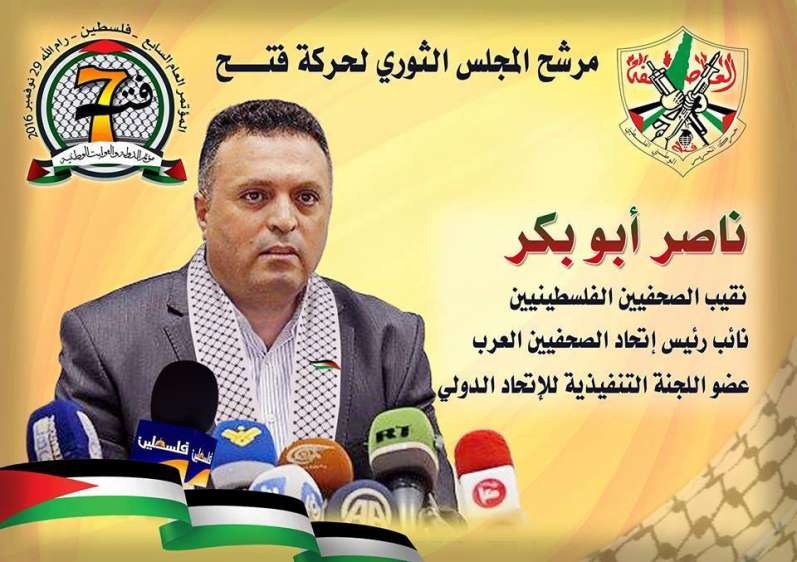“The journalist shall be aware of the danger of discrimination being furthered by the media, and shall do the utmost to avoid facilitating such discrimination based on, among other things, race, sex, sexual orientation, language, religion, political or other opinions, and national or social origins,” declares the Declaration of Principles of the International Federation of Journalists, the world’s largest organization of journalists that represents 600,000 journalists in 140 countries.
One might imagine, then, that this organization that defends press freedom, truth and equality, would vigorously counter a boycott by the Palestinian Journalists Syndicate of Israeli journalists, especially in a discriminatory campaign that endangers Israelis covering the West Bank by sending the message to Palestinian officials and journalists that the Israeli reporters are not welcome there.
That presumably should be the position of an organization which says it “promotes international action to defend press freedom and social justice,” but it is not. Far from condemning the Palestinian Journalists Syndicate’s boycott targeting Israelis, the International Federation of Journalists has come to the defense of Nasser Abu Baker, chairman of the Palestinian Journalists Syndicate and the key prosecutor of the discriminatory campaign against Israelis. In fact, Abu Baker, who has threatened Palestinian officials who dare to speak with Israeli journalists, sits on the International Federation of Journalists’ executive committee.
Nasser Abu Baker (also spelled Abu Bakr) has also worked for years in the West Bank as a reporter for Agence France-Presse, an influential wire service which publishes in six languages. Following an exclusive exposé by CAMERA (Committee for Accuracy in Middle East Reporting in America) in early December about the inherent conflict of interest posed by Abu Baker’s participation in the Seventh Fatah Congress and his failed election bid to join the Fatah Revolutionary Council, the influential Agence France-Press last month slapped him with a week’s suspension and withheld his salary. Participation by journalists in political events, especially those they are covering, is a serious violation of Agence France-Presse’s commitment to “rigorous neutrality” and its pledge that it “is independent of the French government and all other economic or political interests.”

Nasser Abu Baker |
Enter the International Federation of Journalists, which suspended its stated commitments to truth and opposition to discrimination with its Febrary 2 statement about Agence France-Presse’s sanctions against Abu Baker. Issued together with two other venerable outfits, the French Journalists Syndicate and the French Democratic Confederation of Labour (CFDT), the statement read (author’s translation from French):
Journalists’ unions SNJ, SNJ-CGT and CFDT, members of the International Federation of Journalist (IFJ – 600,000 members worldwide), were informed that Nasser Abu Baker, president of the Palestinian Journalists Union, member of the IFJ Executive Committee, and journalist at AFP in Ramallah, had been sanctioned following a dispute with executives.
Despite the union’s interventions with the management, AFP decided abruptly and without further recourse to suspend the work contract of our colleague by a layoff of one week (22 to 28 January 2017) and to deprive him of his salary. The accusations made by the Directorate are mainly based on misinformation from extremist Israeli website claiming that our colleague was elected at the recent Fatah Congress. This was proven inaccurate.
AFP had already tried to prevent Abu Baker from attending the IFJ Congress in France this summer. Again, following information from the same circles [sic].
The union reaction forced AFP to reverse a decision contrary to the right of journalists to be full citizens and to be able to exercise union activities.
The French unions denounce this persistence in attacking our colleague. We know the extreme difficulty of doing his job in a country where Palestinian journalists are particularly exposed to the Israeli military authorities.
Our three organizations will inform the IFJ of this matter and will call for the mobilization of all of our members in the world to denounce this attitude against a union officer.
We demand the full payment of our colleague’s salary.
We request to be received by the Directorate with the representatives of the IFJ to put an end to these systematic attacks against one of our colleagues.
Aside from the revelation that Agence France-Presse finally took steps (albeit insufficient) against Abu Baker, the International Federation of Journalists’ release provides an illuminating window into the corrupt state of affairs at the world’s largest organization for journalists.
First, the International Federation of Journalists’ Declaration of Principles, declares, “Respect for truth and for the right of the public to truth is the first duty of the journalist.” The International Federation of Journalists’ press release, however, is based on a falsehood.
The Federation falsely states: “The accusations made by the [Agence France-Presse] Directorate are mainly based on misinformation from extremist Israeli websites claiming that our colleague was elected at the recent Fatah Congress. This was proven inaccurate.”
Moreover, the organization’s Declaration of Principles included a call to action to hundreds of thousands of journalists worldwide — based on that falsehood.
As of this writing, the International Federation of Journalists has yet to respond to requests that it identify the “extremist Israeli websites” which supposedly claimed that Abu Bakr was “elected at the recent Fatah Congress” (emphasis added). As noted earlier, it was already exposed in English that Abu Bakr, an Agence France-Presse reporter, ran — and lost — in the December Fatah elections.
That Abu Bakr was a delegate to the Fatah Congress and also ran in the elections was first covered in the Palestinian media. There is nothing inaccurate about that.
Queries to the International Federation of Journalists about plans to issue a new press release to make clear that Abu Baker did indeed participate in the Fatah Congress and run for the Fatah Revolutionary Council, or to correct the February 2 release, have gone unanswered.
Agence France-Presse was not the only journalistic entity to recognize that running for political office is a stark violation of a journalist’s obligation to maintain non-partisanship. The Foreign Press Association in Israel, which represents some 480 journalists working in Israel, the West Bank and Gaza, revoked the membership of two other journalists who ran in the Fatah elections this past December: Moussa al Shaer, a cameraman for NHK TV 9 (Japan Broadcasting Corporation), and Mohammed Allaham of Al Arabiyeh. (Abu Baker is not a member of the Foreign Press Association, so it was not in any position to take steps against him.) The Foreign Press Association statement about those journalists read:
The FPA wishes to clarify that members pursuing political careers CANNOT retain their FPA membership. The FPA Constitution clearly states that people who are in government or those who actively seek political office or are engaged in public relations cannot under any circumstances be members, given the unequivocal conflict of interests inherent in the situation.
Consequently the Board has decided to cancel the membership of the persons who recently actively pursued political office. As a one-time concession, an FPA member who is no longer involved in any political/governmental/PR activity may re-apply for membership after a six month cooling off period. The FPA will inform the relevant media offices of this decision.
While the Foreign Press Association issued a strong statement and took appropriate action to send the clear signal that running for office is a clear conflict of interests with journalistic work, the International Federation of Journalists covered up the fact that its own executive committee member ran for office, and attacked Agence France-Presse for supposedly persecuting him with no basis.
Second, there is also the problem that the International Federation of Journalists press release ignores Abu Baker’s indefensible boycott campaign, first exposed last May against Israeli journalists. It is apparently partly in light of that activity that Agence France-Presse took steps against Abu Baker. According to the International Federation of Journalists’ press release, Agence France-Presse tried to prevent Abu Baker from attending the International Federation of Journalists’ Congress in France this past summer, a move that the International Federation of Journalists blocked.
Nasser Abu Baker has threatened Palestinian officials who dared to speak with Israeli journalists, as documented in May 2016.
As deputy chairman of the Palestinian Journalists Syndicate, the Agence France-Presse reporter warned:
I call upon all male and female colleagues/journalists to boycott any Palestinian official, regardless of how senior he/she is, who conducts an interview with Israeli journalists and Israeli media… this poisonous media whose only goal is to broadcast dissent and incite against our people. Their media, which is directed by their government, is one of the tools of the occupation. Therefore, the time has come for a comprehensive boycott of their media. The Syndicate will have a clear position on this and I plead with all the journalists to abide. We will publish the name of any official who gives an interview to their media from this moment.
The Palestinian Journalists Syndicate also formally backed the boycott, putting out a similar statement, which was covered in Palestinians48.net, an Israeli-Arab site. The site reported that the Palestinian Journalists Syndicate called on its members and Palestinian officials to boycott Israeli media “in light of the continued and escalating Israeli assaults on Palestinian journalists.” The Syndicate said in a statement that “Israeli journalists and Hebrew media outlets enter the lands of the State of Palestine and work there together with — and under the protection — of the Israeli occupation army.” The Syndicate also called on “all Palestinian officials not to deal or give interviews or statements to Israeli reporters, pointing out that it will follow up on the implementation of this decision, including taking positions against those who violate.”
Abu Baker posted a similar statement announcing the boycott, signed by the Palestinian Journalists Syndicate “general secretariat,” to his Facebook account last February, and subsequently removed the page following an investigation. [1]
The International Federation of Journalists has so far failed to explain how its silence on Palestinian Journalists Syndicate’s discriminatory campaign against Israelis is compatible with the organization’s stated belief that journalists should “do the utmost to avoid facilitating such discrimination based, on among other things … national or social origins.” Indeed, the International Federation of Journalists’ embrace and defense of Abu Baker, the leading figure behind the campaign endangering Israeli journalists, runs directly counter to the group’s codes.
An additional key principle of the International Federation of Journalists also appears to have presented a challenge for Abu Baker: “Respect for truth and for the right of the public to truth is the first duty of the journalist.”
For example, Abu Baker attended a conference in Jordan in March last year where he made the completely unfounded allegation that Israeli hospitals are treating 5000 ISIS members, as reported last May.
According to a March 29, 2016 article in Al Watan, a Gaza-based independent news website:
Abu Baker said in an interview with Mawteny radio that he attended the conference of Media and Terrorism [in Jordan] in order to expose the crimes and practices of the Israeli occupation. He said, “We asked Arab media people to intensify their effort to expose the Nazi and racist crimes of the Israeli occupation against the Palestinian people and to bring back the Palestinian cause to the center of the Arab media’s attention.”
He said that the Israeli occupation has implemented its DAESH [ISIS] practices against the Palestinians by destroying Palestinian villages, daily executions, arrests and the targeting of children and journalists in the field. He held the Netanyahu government responsible for legitimizing these practices against the Palestinian people.
The International Federation of Journalists’ refers to “calumny, slander, libel, unfounded accusations” as “professional offenses.” The world’s largest organization of journalists also has yet to explain whether it believes that Abu Baker’s accusations regarding supposed Israeli Nazi and ISIS practices fall in that category or whether they reflect “respect for truth.”
In any event, it is evident that there is no truth behind the International Federation of Journalists’ lofty “respect for truth.” Nor is there any justice at the International Federation of Journalists, which pretends to fight for freedom of press and against discrimination, but which provides cover and comfort to Abu Baker, and which actively discriminates against Israeli journalists, denies them their freedom of press, and which endangers their lives by sending the message to Palestinian officials and journalists that the Israeli reporters are not welcome there.
Journalists who do genuinely care about these values should take note: The International Federation of Journalists does not represent you.
Tamar Sternthal is director of the Israel office of CAMERA (Committee for Accuracy in Middle East Reporting in America).
[1] The boycott campaign against Israeli journalists has endangered their safety, and many have simply stopped reporting from Palestinian areas, according to a veteran Israeli journalist who refused to be named because of his ongoing work in Palestinian areas. For years, Israeli journalists moved freely through Palestinian areas, secure in the knowledge that they enjoyed protection from their Palestinian colleagues, he told this writer last spring.
That is no longer the case, he lamented. He reported that he avoids demonstrations and crowds, fearing that the Palestinian journalists upon whom he once relied for protection would be the first to call in forces to expel him, or worse. He described his work visit to Bethlehem last Christmas, in which he repeatedly evaded Palestinian journalists who might recognize him. Before the boycott, “if something bad were to happen, we would have someone to count on,” he noted.

















